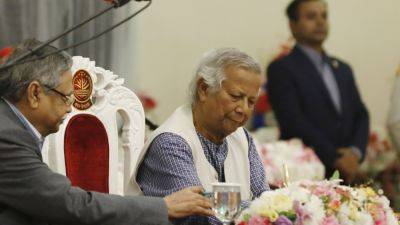Fears of waterborne disease rise in Bangladesh as floods recede slowly
DHAKA — Authorities in Bangladesh are bracing for the spread of waterborne diseases and racing to get drinking water to people after devastating floods last week that left at least 54 people dead and millions stranded.
As floodwaters recede slowly, many people remain stranded and in urgent need of food, clean water, medicine and dry clothes, especially in remote areas where blocked roads have hindered rescue and relief efforts.
The Bangladesh Meteorological Department said that flood conditions could persist if the monsoon rains continued, as water levels were receding very slowly.
Around 470,000 people have taken refuge in 3,300 shelters across 11 flood-hit districts, where around 600 medical teams are helping provide treatment, with the army, air force, navy, and the border guard assisting in rescue operations, authorities said.
A disaster management ministry official warned that as floodwaters recede, there is a risk of an epidemic, adding that the outbreak of waterborne diseases is likely if clean water is not provided soon.
"Our top priority is to ensure the availability of safe drinking water," the official said.
In the past 24 hours, around 3,000 people have been hospitalised due to waterborne diseases in flood-hit areas, according to the Directorate General of Health Services. Many areas remained submerged, preventing stranded people from accessing healthcare facilities.
"Water is everywhere but there is no clean water to drink. People are getting sick," said Farid Ahmed, a resident of one of the worst-hit districts, Lakshmipur.
Vast areas of land are submerged, posing a significant threat to crops, agriculture ministry officials said.
The UN children's agency has warned that two million children were at risk as







